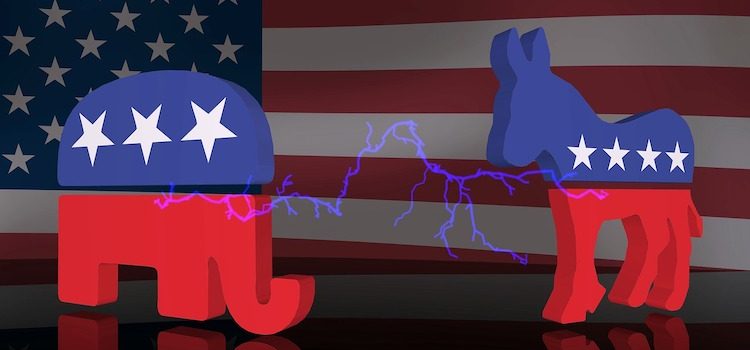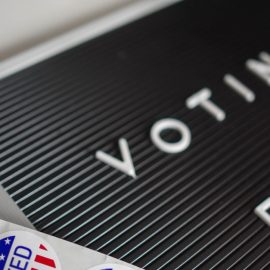

This article is an excerpt from the Shortform book guide to "The Righteous Mind" by Jonathan Haidt. Shortform has the world's best summaries and analyses of books you should be reading.
Like this article? Sign up for a free trial here .
What are the underlying reasons for the political divide in America? How could we understand each other better?
Jonathan Haidt’s moral foundations theory can help us answer these questions. In The Righteous Mind, Haidt explains how moral foundations work in the context of politics in the U.S. This application provides insight into today’s political divide.
Read more to learn how different moral foundations contribute to the political divide.
Understanding America’s Political Divide
This article moves through the first five principles of Haidt’s moral foundations and explains how they work in the context of American politics.
#1: The Care/Harm Foundation
The Care/harm foundation prioritizes the values of kindness and nurturing. Mothers spend so much time with their child inside of them, and their children need so much help to survive in their first few months (which leads mothers to spend a lot of time with their baby), that of course they’ll have some innate feelings towards their child. This is evolutionary—mothers who have an innate feeling of protectiveness and an understanding of distress or suffering in their child can better help their child survive. Evolution favors mothers in this respect, but the suffering of anyone’s own kin can create this same sort of foundation. People can feel attached to lots of creatures or objects that aren’t their biological children as well, such as animals or people in faraway countries.
In the U.S., liberals rely much more on the Care/harm foundation than conservatives. For instance, a liberal might have a bumper sticker to this effect, with a message like “Save Darfur” or “Peace” or even “Save the Planet.”
The Care/harm foundation is part of the conservative morality as well, but it’s not as foundational, and thus we see a political divide in this area. For example, conservatives might have a bumper sticker like “Wounded Warrior,” which asks for care for people who have sacrificed for the larger group.
#2: The Fairness/Cheating Foundation
The Fairness/cheating foundation prioritizes the values of rights and justice. We play “tit for tat”: We are nice to people who are nice to us. Many types of situations encourage this sort of cooperation. Coworkers will cover each other’s shifts or neighbors watch each other’s houses. They’re doing so because they’re happy that people trust them, and also because they believe they’ll get the same treatment back. When our kindness is not returned we become angry at the lack of reciprocity and feel cheated.
The left and the right are both concerned about fairness in American society but in different ways, contributing to the political divide. The left is often angry that the rich don’t pay their “fair share.” The right argues that Democrats are trying to take money from Americans who work hard and give it to lazy people or illegal immigrants. Fairness is utter equality on the left but proportionality on the right (people are rewarded for their contribution to society).
#3: The Loyalty/Betrayal Foundation
The Loyalty/betrayal foundation prioritizes the values of patriotism and self-sacrifice for the good of the group. For thousands of years, humans created groups in order to fend off rival groups. This trait still exists within us strongly, especially within men, who are predisposed to create groups that can go to battle with others (men are just more likely to express their teamwork on a baseball diamond than at war these days). This creates an intense and innate sense of loyalty within all of us and a hatred of traitors, who are worse than enemies that are honorable, because they have given up the principle of loyalty.
The left has much more trouble using the loyalty foundation to their advantage because they often disparage nationalism and sometimes American foreign policy. Conservatives, who are more willing to tap into the loyalty foundation, will often call liberals traitors because they aren’t sufficiently behind “the team.” This difference fuels the political divide.
#4: The Authority/Subversion Foundation
The Authority/subversion foundation prioritizes the values of leadership, deference, and tradition. Authority given to people at the top of a hierarchy, like a king, also comes with responsibility. People in a hierarchy have mutual expectations of each other—we expect those at the top to protect those at the bottom while we expect those at the bottom to serve those at the top. The authority foundation looks up and down at the same time and helps people form good relationships with people above and below them in a hierarchy.
Again, it is easier for the right to adopt this foundation for their use than the left, because the left defines itself against hierarchy and the inequality and power structures that result.
#5: The Sanctity/Degradation Foundation
The Sanctity/degradation foundation prioritizes the values of purity and sanctity. This foundation is based on the idea that, unlike mere animals, we have a soul. Sacredness helps us build communities around a shared principle—often that humans have a creator or creators who ask them to perform specific rituals to maintain honor. The cultures that rely on this foundation may be more likely to believe immigrants will bring disease or dishonor into their society. Certain actions are unacceptable because they are too dirty (like drinking straight from the Hudson River in New York City) and others are untouchable because they are too sacred (like a cross for Christians, or even the principle of liberty for Americans).
American conservatives talk about “the sanctity of marriage” or “the sanctity of life” much more than liberals. Religious conservatives especially rely on this foundation, as they are likely to view the body as housing a soul.
However, the spiritual left uses the sanctity foundation as well. Think about New Age products that promise to clean you of “toxins.” In addition, factions of the environmental movement are sometimes concerned with symbolic pollution as well as material pollution. They discuss how industry and unfettered capitalism have degraded nature and man’s original state.
From the time we are born, the foundations of our morality are in place. Think of the human brain like a book that had its first draft written while you were in the womb. None of it is complete, but there’s an outline in place. As you grow into adulthood, you start writing your book—you can change the outline, as you go, but most people don’t.
Understanding the foundational reasons for the political divide helps us empathize with others and see things from their point of view, which is more important than ever.

———End of Preview———
Like what you just read? Read the rest of the world's best book summary and analysis of Jonathan Haidt's "The Righteous Mind" at Shortform .
Here's what you'll find in our full The Righteous Mind summary :
- Why we all can't get along
- How our divergent moralities evolved
- How we can counter our natural self-righteousness to decrease political divides






